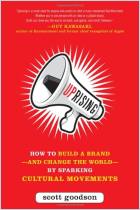
Market Rebels
How Activists Make or Break Radical Innovations
Recommendation
In the introduction to this book, author Hayagreeva Rao mentions that some sections have appeared in academic journals, but that he’s “rewritten [them] for the general reader rather than the specialist in organizational sociology.” May all such revisions be so smoothly executed! This fast-paced read features clear concepts and lively prose. Rao examines the role of social activists, especially engaged groups, in the fate of innovation. In doing so, he provides new perspectives on markets and documents that social engagement precedes shifts in the market. He educates readers about the techniques that such activists use, offering several radically different case studies, including the auto industry, microbrews and trends in French cooking. getAbstract recommends Rao’s book to anyone involved in innovation or marketing, as well as to students of cultural change.
Summary
About the Author
Hayagreeva Rao teaches in Stanford’s Graduate School of Business.
















Comment on this summary or Comenzar discusión